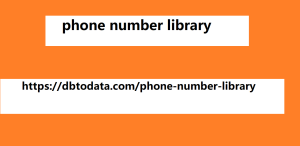Why? Because internal links can help search engines index and understand the structure of a website better. Why Do We Need Internal Links? From we may have the explanation above, what internal links are and their main functions. However, there are actually many benefits that can be obtained from using internal links. Through the use of internal links, we can get benefits, such as: 1. Facilitate Visitor Navigation Internal links can help website visitors find the information they are looking for more easily and quickly. With better navigation, the user experience will improve and they will likely spend more time on our site.
2. Helps Page Indexing
Search engines use internal links to find new pages on our website. With a good link structure, we can ensure that all important pages on our website are uruguay phone number library indexed by search engines. Thus the visibility of the site will certainly also increase. 3. Sharing Page Authority Internal links can help share page authority (link juice) from one page to another. From here we can also increase the ranking of the linked page in search results. 4. Increase the Relevance of Content Topics Another benefit of internal links is that they help connect relevant content within a website.
In addition to helping visitors,
Proper use of links can also help search engines understand the main topic of the website. That way, search engines will recommend your site. 5. Building Website Structure With relevant and appropriate internal links, you can build a more organized website structure. You can make it easier for visitors and search engines to explore and understand the content on our website. Difference between Internal and External Links When discussing website optimization, we often hear the terms internal and external links. Both types of links are equally important for SEO, but they have different roles and functions.
Understanding the difference between
the two will help you use links more effectively in managing a website. Here are some aspects that differentiate them: Use Internal links are links that access to new collaborations direct users from one page to another page within the same site, while external links are links that take users to other pages outside the site. For example, when you are reading an article on a blog and find a link that takes you to another page on the same blog, that is an example of an internal link. On the other hand, if the link leads to a different website, then it is called an external link.
Impact on Website
Internal links help search engines job data better understand the structure of your site. Since search engines use internal links to crawl every page on your site, they can help ensure that each page is indexed properly. If you have important pages, using internal links strategically can help boost their rankings in search results. On the other hand, external links play a role in showing authority and credibility. When you link trusted external links, you can increase the value of your content in the eyes of search engines. However, the use of external links must also be selective.


